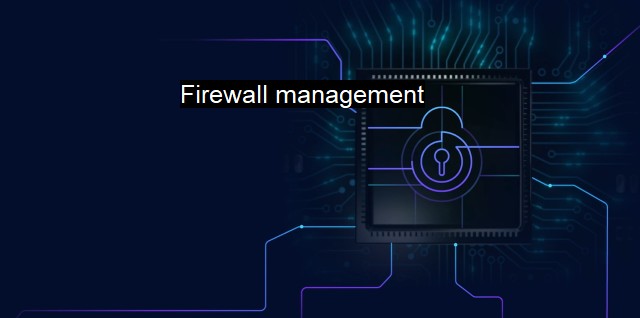What is Firewall management?
The Importance of Firewall Management in Cybersecurity: Safeguarding Networks Against Threats and Attacks
Firewall management is a fundamental aspect of cybersecurity that focuses on handling and overseeing the functioning of firewall systems strategically located within a network environment. These systems serve the purpose of blocking unauthorized access from external sources, while allowing legitimated information to flow through seamlessly. Firewalls serve as the primary defense mechanism to secure an organization’s or an individual’s sensitive data from various online threats such as hackers, viruses and spyware.Firewall management entails setting up, monitoring, maintaining, and updating firewall rules and policies in an organized manner. Such management of firewalls ensures a high level of security, protects against cyber threats and improves overall network performance. Firewalls can be hardware or software or a combination of both and can either be positioned on the network perimeter only or dispersed throughout the network on all devices.
The security of a system is compromised when firewall policies are incorrectly configured or not properly updated. Hence, firewall management also covers reviewing and auditing firewall rules and configurations routinely to ensure their efficiency and relevancy. It's critical to clarify what type of internet traffic is allowed or disallowed through the firewall and under what circumstances. This is typically accomplished through the configuration of precise rules catered to the organization's specific security needs and goals. Therefore, a significant element of firewall management is defining and occasionally revising these guidelines.
Firewall management involves monitorization of network traffic that enters and exits a system. This monitoring allows for scrutiny of information packets and blocking of potentially hazardous data thereby preventing damage. Through this evaluation, attempts of unauthorized access can be detected and halted timely.
Most importantly, firewall management extends to regular patching and updates in order to stay current with the constantly advancing cyber threats. Cybersecurity is an ever-evolving field and antiquated firewall systems can leave a network highly vulnerable. In this perspective, firewall management includes staying updated with the latest threat intelligence, implementing necessary baseline configurations and addressing identified vulnerabilities.
Firewall management could also encompass occasional third-party reviews for an unbiased assessment of firewall security. This analysis can identify weak spots and potential improvements to enhance protection further.
Firewall management does come with its own potential challenges which may include complexity due to the highly advanced nature of firewall technology, lack of internal experts to handle firewall maintenance, or compliance issues with legal and industry mandates. Thus, managed firewall services are becoming increasingly prevalent. These encompass handing over the responsibility of end-to-end firewall management to specialized cybersecurity firms. These providers manage and monitor a company's firewalls round-the-clock to keep systems updated and protected from breaches.
Firewall management is a key cybersecurity process that ensures the continuous and efficient functioning of firewall systems by implementing, monitoring and governing firewall policies and rules. It is a proactive approach to safeguarding an establishment's networks and systems against a multitude of online threats. In the face of growing digitalization and accelerated cybercrimes, firewall management has become an indispensable facet of comprehensive antivirus strategies and overall IT security of entities.

Firewall management FAQs
What is firewall management and why is it important in cybersecurity?
Firewall management involves configuring and maintaining firewall technology to protect a network from unauthorized access, outgoing threats and data breaches. Firewalls are essential in cybersecurity because they act as a barrier between a trusted internal network and untrusted external network or the internet at large. Proper firewall management ensures that only authorized traffic is allowed into a network and that sensitive information is protected from outside threats.What are the different types of firewalls and which one is the best fit for my network?
There are several types of firewalls such as packet filtering, application-level, stateful inspection, and next-generation firewalls. The choice of the best firewall for your network depends on your specific requirements for security, ease of management, and scalability. For example, packet filtering is a basic firewall technology that can block traffic based on predefined rules while stateful inspection firewalls can analyze entire communication sessions to identify and block malicious activities. Consulting with cybersecurity experts can help you identify the best firewall solution for your network.What are some common firewall management challenges and how can they be addressed?
Some common firewall management challenges include managing large-scale firewall deployments, ensuring compliance with regulatory requirements, managing firewall policies across multiple environments, and keeping up with emerging threats. These challenges can be addressed by using automated firewall management tools, hiring experienced cybersecurity professionals, streamlining firewall policy management, and regularly updating firewall configurations to mitigate new threats.How can I evaluate the effectiveness of my firewall management strategies?
Evaluating firewall management strategies involves monitoring and analyzing firewall activity logs, testing firewall configurations for vulnerabilities, and benchmarking firewall performance against industry best practices. Firewall monitoring tools can help you identify any suspicious activity or policy violations that may compromise your network security. Regularly testing firewalls for vulnerabilities using penetration testing or vulnerability scanning can help identify any gaps in your network security posture. Lastly, benchmarking firewall performance and configuration against industry standards or compliance frameworks can help ensure that your firewall is up-to-date and secure.| | A | | | B | | | C | | | D | | | E | | | F | | | G | | | H | | | I | | | J | | | K | | | L | | | M | |
| | N | | | O | | | P | | | Q | | | R | | | S | | | T | | | U | | | V | | | W | | | X | | | Y | | | Z | |
| | 1 | | | 2 | | | 3 | | | 4 | | | 7 | | | 8 | | |||||||